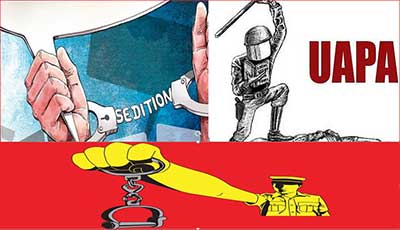Relevance: GS-2 : Issues Arising Out of Design & Implementation of Policies, Government Policies & Interventions, Fundamental Rights, Judgements & Cases, Indian Constitution
Key Phrases: Section124 A, Presumption of Guilt, Burden of Proof, Terrorist Act, Unlawful
Why in News?
- Recently the Union Government has shown willingness to reconsider the colonial Sedition law in the spirit of Azadi ka Amrit Mahotsav.
- The exhaustive database of Article 14 which is corroborated by the NCRB data reveals that more than 13,000 Indians are trapped in a black hole since 2010.
- As long as the Unlawful Activities Prevention Act (UAPA) is untouched, dissent will continue to be criminalized. The government will claim moral victory but nothing really will change in substance.
Provisions of Section 124A:
- Section 124A IPC (Indian Penal Code) states: “Whoever, by words, either spoken or written, or by signs, or by visible representation, or otherwise, brings or attempts to bring into hatred or contempt, or excites or attempts to excite disaffection towards, the Government established by law in India, shall be punished with imprisonment for life, to which a fine may be added; or, with imprisonment which may extend to three years, to which a fine may be added; or, with fine.”
- A person charged under this law can’t apply for a government job.
- They have to live without their passport and must present themselves in the court as and when required.
Unlawful Activities (Prevention) Act,1967 UAPA Provisions
- Unlawful Activities (Prevention) Act,1967 is primarily an anti-terror law – aimed at more effective prevention of certain unlawful activities of individuals and associations and for dealing with terrorist activities.
- Key Provisions of the Act:
- The Act assigns absolute power to the central government. It can declare an activity as unlawful, by way of an Official Gazette.
- The act has the death penalty and life imprisonment as the highest punishments.
- Under the act, both Indian and foreign nationals can be charged. It will be applicable to the offenders in the same manner, even if the crime is committed on foreign land, outside India.
- The investigating agency can file a charge sheet in maximum of 180 days after the arrests. This duration can be extended further after information to the court.
- 2004 Amendment:
- The act was amended in 2004. It added “terrorist act” to the list of offences, to ban organizations for terrorist activities.
- Till 2004, “unlawful” activities referred to actions related to secession and cession of territory. Following the 2004 amendment, the “terrorist act” was added to the list of offences.
- 2019 Amendment:
- The amendment empowers the Central Government to designate individuals as terrorists on certain grounds.
- It empowers the Director-General, National Investigation Agency (NIA) to grant approval for seizure or attachment of property when the case is under investigation by the agency.
- It also empowers the officers of the NIA, of the rank of Inspector or above to investigate cases of terrorism in addition to those conducted by the DSP or ACP or above rank officer in the state.
Relation between UAPA and Sedition Law:
Why just removing Sedition Law will not help achieve the objective?
- The sedition law under Section124 A is a part of the Indian Penal Code (IPC) where along with penal provisions, there are safeguards and constitutional remedies which make bail easier.
- However, these safeguards are not available to those charged under UAPA. As an anti-terror law, it has more stringent provisions and far fewer safeguards. For instance, UAPA permits detention without a charge sheet for upto 180 days, creates a presumption of guilt, places the burden of proof on the accused and creates a strong presumption against bail.
- Arrests under sedition law may have risen but the conviction rate is as low as 2.25 per cent. Of the 399 cases that were registered between 2014-20, just nine were convicted.
- In UAPA the conviction rate is higher. NCRB data reveals that between 2014-2020, 27.5 per cent of the cases saw convictions. But what is more damning being that very few cases even reach the stage where innocence or guilt is proven.
- Many of those charged under sedition are also slapped with charges under the UAPA - Umar Khalid, Sharjeel Imam, Tahir Hussain, Khalid Saifi, Siddique Kappan to name a few. For all the attention the sedition law has received, it is the UAPA that do more damage.
Conclusion:
- Civil liberties stand precariously poised in India today. The removal of the sedition law makes a dent, but it will be small and ineffective if the road-roller of civil liberties — the UAPA — remains untouched.
- It is expected that after the SC interim order, those imprisoned under the sedition law are likely to get immediate bail. Hence we can celebrate the sedition law’s much-awaited demise, but we should not miss the wood for the trees.
Sources: Hindustan-Times The Wire
Mains Question:
Q. Recently Central government has decided to reconsider the validity of the Sedition law. In this context discuss the laws which are majorly used to stifle dissent and also why just striking off Sedition Law will have little impact if other such laws remain intact?








